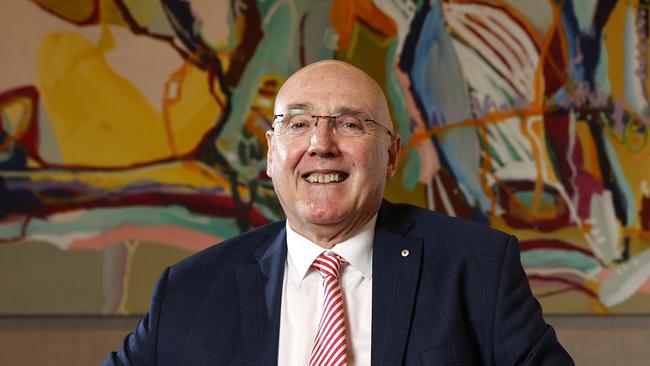Put more focus on VET, says skills tsar Barney Glover
The nation’s skills tsar Barney Glover says there is a ‘parity of esteem challenge’ which favours universities over vocational education, declaring that there needs to be a ‘rebalancing’ in favour of technical training.

The nation’s skills tsar Barney Glover says there is a “parity of esteem challenge” placing universities above vocational education, declaring there needs to be a “rebalancing” towards technical training.
As the nation battles a persistent skills gap with 33 per cent of occupations in shortage, Professor Glover said addressing the gender imbalance in many professions would be pivotal to fixing the crippling workforce challenges.
Speaking about nine months after he assumed the role as Jobs and Skills Commissioner, the former vice-chancellor said while both university and VET enrolments needed to grow, a “rebalancing” towards VET was required.
“There’s a real, what we call a parity of esteem challenge, and this is true in a multicultural society like Australia. You have some people who really believe the only success story is a university qualification,” Professor Glover told The Australian.
“And those families are very committed to doing all they can to ensure that their children have every opportunity to go on to study at university.
“We need to provide the information and the encouragement to families and to young people that there are really exciting career opportunities that come out of … vocational education and training.
“And there’s also a great opportunity to go to university after you’ve finished a VET qualification, or if you’ve finished your university qualification, then to do a VET qualification. These things are complementary, not alternatives, quite often. So we need to build that esteem.”
Ahead of a year in which the commission – established by the Albanese government in 2022 – will focus on gender economic equality and the impact of AI on the workforce, Professor Glover said the solution should begin at the high school level.
“We need our states and territories responding to ensure that opportunities are there in school, not just the careers advice, but for the VET in schools programs and other programs that really can enable young people … to think about alternatives to the ATAR and university,” he said.
“And then we’ll start to see a rebalance. Both VET and higher education need to grow. We just need to see a rebalancing over the next five years.”
After a year in which the commission contributed to Labor’s migration reforms and the creation of a new skills and demand visa system, Professor Glover said it was not a solution to solely rely on migration to address the skills gap.
“We don’t want to necessarily rely on skill migration to address shortages, but to understand the reasons for shortage,” he said.
“We need to do that. We need to encourage young people into vocational training, and we’re going to need a lot of growth in higher ed, because a lot of the jobs of the future are going to demand those higher level skills.”
Professor Glover said training up a workforce of technicians to rewire the grid for the renewable transition – a task the commission has estimated will take 32,000 electricians – would require applicants from non-traditional demographics to enter the trade.
“If we are to get anywhere near that target, we are going to need to encourage a lot of people who are not traditionally part of that workforce to consider it,” he said.
Professor Glover said gender imbalance within a profession was a major driver of a workforce shortage, with occupations with a largely male or female dominated workforce being more likely to struggle to recruit workers.
“About 50 per cent of occupations which are male-dominated are in shortage, and 40 per cent of female-dominated occupations are in shortage,” he said.
“If you have a balanced workforce, only 22 per cent of those occupations are in shortage.
“The key message here is, if you tap into the breadth of the potential labour market, you’re much less likely to have a shortage.”
Professor Glover, who sat on a panel of sector leaders that oversaw the Universities Accord, said a significant outcome of the report had been highlighting the importance of under-represented groups who are accessing higher education and training.




To join the conversation, please log in. Don't have an account? Register
Join the conversation, you are commenting as Logout